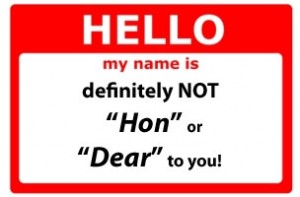 Here comes a pet communication peeve of mine – I absolutely hate when total strangers, usually female but both genders offend, call me “Hon” or “Dear” – ewww. Yeah, yeah they don’t mean to offend; they don’t think they’re being offensive. But really – boundaries with your language, please! You can’t take a term of endearment (I call my husband ‘Hon’) and bandy it about so loosely that the term is rendered meaningless. Not fair, and not anyone’s right to ruin.
Here comes a pet communication peeve of mine – I absolutely hate when total strangers, usually female but both genders offend, call me “Hon” or “Dear” – ewww. Yeah, yeah they don’t mean to offend; they don’t think they’re being offensive. But really – boundaries with your language, please! You can’t take a term of endearment (I call my husband ‘Hon’) and bandy it about so loosely that the term is rendered meaningless. Not fair, and not anyone’s right to ruin.
You might think that people who deal with a variety of people every day in a service industry, i.e. waitress, retail sales – would be good in their communication skills, but clearly many (most?) are not. Of course I could just ignore your ignorance, if it just wasn’t so annoying. And I could logically tell myself that your language is just a habit you’ve developed and you don’t even hear yourself anymore, you’ve been saying it for so long (a deeply entrenched habit, hard to break, like swearing). Logically I know that a term of endearment from a stranger is meaningless, but certain language pushes buttons for certain people that, logical or not, is hard to emotionally dismiss.
Maybe “Hon” and “Dear” are not derogatory words to get upset about, not containing negative connotation, so what’s the offense? It just bugs me when people are not authentic, and are clearly not being genuine. And no one genuinely has intimate affection for a total stranger. I automatically don’t like you when you use that language, which you think is harmless, but pretends for a closeness that is not only not real, is not wanted, and is obviously false.
So why do we do it – why do we label people with our communication? We do it for effect – we want them to feel a certain way (usually pleasant), to flatter, to endear. All good reasons, when properly utilized to the right audience. Research tells us that people love to hear their name spoken, as their favorite word. When we don’t know their name to address them by, what should be substituted? Commonly that answer politely is, “Miss” or “Madam” or “Sir”.
With guys, “Sir” is easy and respectful. But watch out with females – not so easy to determine the age line between “Miss” and “Madam”. My 20-something daughters often hear “Madam” (which they hate, and they look young too!) and I still can get “Miss” (yes!). The safe route with all females is “Miss” across the board for all ages; you can’t offend, and will bring a smile to all seniors J
One way to use labels to your advantage is when you want to influence, use a positive label. Humans tend to live up to positive labels when assigned, and are pleased to think they possess the positive trait once stated. This is why parents leave their kids with, “You’re my good boy” and the child does not disappoint. A negative label, “Don’t be bad while we’re out” has the same, though undesirable, effect. Watch your words. They are powerful.
So when I tell you, smart readers, that you will learn much about communication and honing your communication skills, by reading my blog and website, you know what to do 🙂
